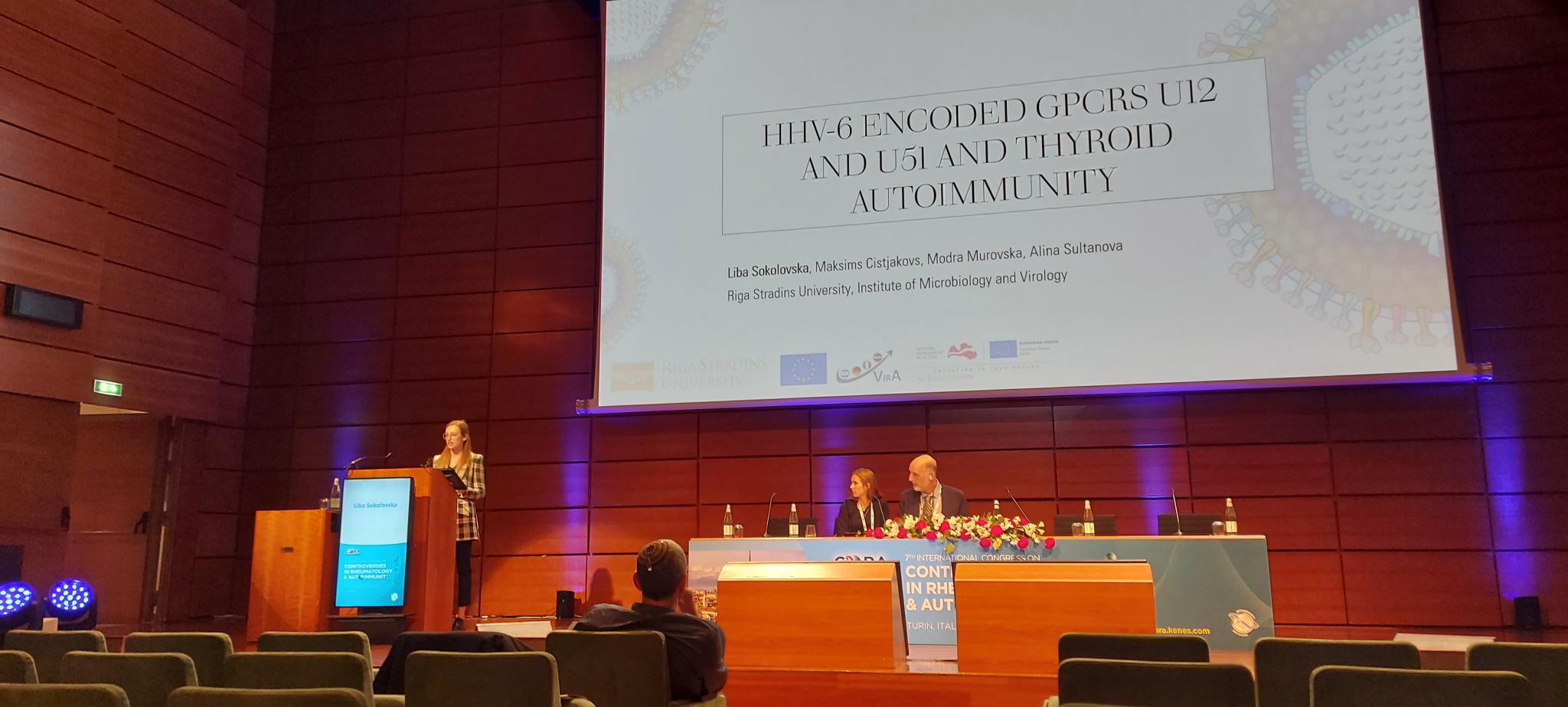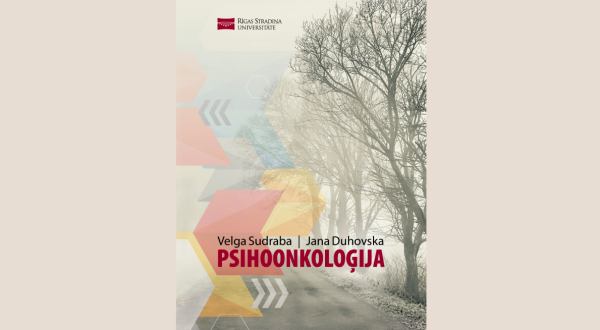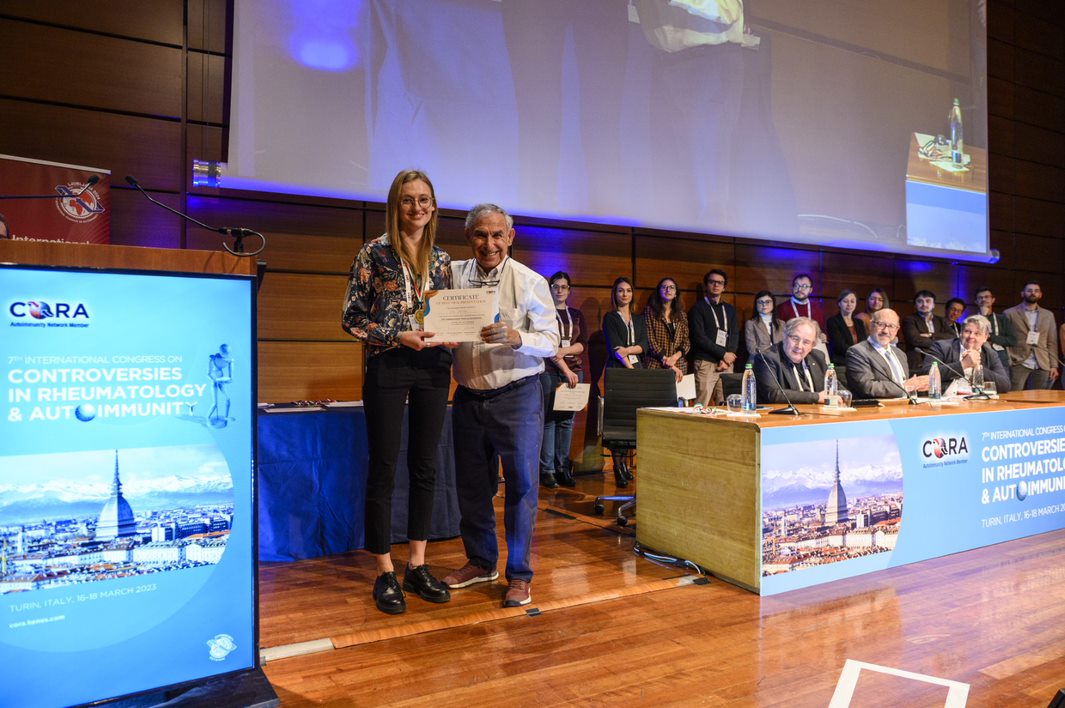Young Researcher from RSU Receives Award at International Congress
Lība Sokolovska, a researcher at the Rīga Stradiņš University (RSU) Institute of Microbiology and Virology and a doctoral student, won the award for the best oral presentation in the Free Communications session Pearls in Autoimmunity at the 7th International Congress on Controversies in Rheumatology and Autoimmunity (Turin, Italy).
The International Congress on Controversies in Rheumatology and Autoimmunity is one of the most important events in the field of rheumatology and autoimmunity and took place on 16 to 18 March this year.
Together with her colleagues from the Institute of Microbiology and Virology, Lība Sokolovska is researching autoimmune thyroid diseases, where the virus is one of the most common trigger factors.
In their research, the institute's researchers use patients' biological material - blood, tissue, etc, to look for the virus, as well as antibodies and other markers of viral infection. ‘The data is then put together with the patient’s clinical picture, so that step by step, we can find patterns and make new discoveries in the viral world,’ says Modra Murovska, leading researcher at RSU, virologist, and one of Sokolovska's thesis supervisors, to explain the specifics of the study that is being carried out at the institute.
Are you a virologist?
I completed my bachelor’s and master’s studies at the Department of Microbiology and Biotechnology at the Faculty of Biology at the University of Latvia.
I have worked on viruses, like the human papillomavirus, the human herpesvirus 6, SARS-CoV-2, for my entire career as a researcher.
You are currently a doctoral student at RSU.
Yes, I am a 3rd year student in the Medicine sub-programme of the RSU Health Care doctoral programme.
What was the title of your oral presentation for which you received the award?
HHV-6 encoded GPCRs U12 and U51 and thyroid autoimmunity.
What was the presentation about?
Autoimmunity is a complex process that involves both a person's genetic predisposition to a disease and environmental factors, of which viruses are an important one.
Human herpesvirus 6 (HHV-6) is one of the viruses often considered to be a trigger for various autoimmune diseases, including autoimmune thyroid disease.
Although several studies have demonstrated a relation between autoimmune thyroid diseases and HHV-6, the exact mechanisms involved are unclear.
Together with Maksims Čistjakovs, Modra Murovska and Alīna Sultanova who are my colleagues at the Institute of Microbiology and Virology,
we have put forward a hypothesis that two little-studied HHV-6-encoded proteins, U12 and U51, play a certain role in the relation between autoimmune thyroid diseases and HHV-6.
They are both similar to human chemokine receptors and can bind and affect a number of human chemokines (proteins secreted by both immune cells and infected cells to ensure intercellular interactions and coordinate immune responses). They can also be expressed or translocated to the surface of infected cells, and studies suggest that they could promote viral replication or multiplication.
 RSU Mikrobioloģijas un virusoloģijas institūta pētniece Lība Sokolovska uzstājas 7. Starptautiskajā reimatoloģijas un autoimunitātes kongresā Turīnā. Foto no privātā arhīva
RSU Mikrobioloģijas un virusoloģijas institūta pētniece Lība Sokolovska uzstājas 7. Starptautiskajā reimatoloģijas un autoimunitātes kongresā Turīnā. Foto no privātā arhīva
To further investigate the relation between HHV-6 and thyroid autoimmunity and clarify the role of U12 and U51 in this process, we analysed thyroid tissue and plasma samples from 81 patients with autoimmune Hashimoto's thyroiditis, an autoimmune disease that causes progressive thyroid hormone deficiency.
HHV-6 DNA was detected in all thyroid tissue samples, and HHV-6 infection was active in more than half. A previously published study carried out by our group showed that only 1/30 samples of thyroid tissue from people without autoimmunity had active HHV-6. In 75% of thyroid tissues with active HHV-6 infection, U12/ U51 expression was also found, and the viral load in thyroid tissue was significantly higher in its presence. Both U12- and U51-specific antibodies could be detected in plasma samples from patients with autoimmune thyroid disease. Antibody levels were significantly higher in patients with active HHV-6 infection.
Microscopy of thyroid tissue has also been started to visualise the expression of these HHV-6 proteins. Our preliminary results showed that U12/ U51 expression in the thyroid gland is found alongside HHV-6 glycoprotein expression.
Overall, our results strengthen the belief that HHV-6 is associated with autoimmune thyroid diseases and suggest that U12/ U51 might help the virus to replicate in the thyroid gland and that these proteins induce antibody production, but
further research is needed to find out what role these antibodies and viral proteins play in the development or progression of the disease.
Why did you choose research?
I chose to study biology by accident, but I have never regretted it. From the beginning of my studies, I was interested in molecular biology, microbiology, and virology. The microscopic and molecular world seemed to be something unfathomable and endlessly fascinating – how can such small molecules in biochemical pathways, or viruses know how to do the things they do?
As I was looking for a place to develop my semester paper, I came across the RSU Institute of Microbiology and Virology. I worked on my semester paper, then my bachelor's and master's theses there, and now I am working on my doctoral thesis here.
What attracts you to research?
I can't imagine doing anything else! All the "normal" professions seem boring.
In research, I am passionate about continuously updating my knowledge, because I cannot imagine my life without learning, solving problems, expanding my skills, and presenting my result.
Related news
 Book on psycho-oncology: resource for studies, professional practice and patient supportPsychology, For Students, Books
Book on psycho-oncology: resource for studies, professional practice and patient supportPsychology, For Students, Books



